Residential buildings hit as Russian missiles strike Kyiv
Russia attacked the Ukrainian capital in the early hours of Sunday morning, striking at least two residential buildings in the Shevchenkivskyi district, Kyiv’s mayor, Vitali Klitschko said.
Emergency services said that as a result of the Russian shelling a fire broke out in a nine-storey residential building, which had been partially damaged in the attack.
Klitschko said that residents are being rescued and evacuated from two buildings.
“There are people under the rubble,” Klitschko said on the Telegram messaging app. He added that several people had already been hospitalised.
“They (the rescuers) have pulled out a seven-year-old girl. She is alive. Now they’re trying to rescue her mother.”
Air raid sirens regularly disrupt life in Kyiv, but there have been no major strikes on the city since 5 June, when a rail car repair facility was hit on the outskirts, and a late April shelling when a Radio Liberty producer was killed in a strike that hit the building she lived in.
The historic district, one of Kyiv’s central, is home to a cluster of universities, restaurants and art galleries.
The blasts occurred around 6.30am local time, half an hour after air raid sirens sounded in the capital.
Our correspondent, Lorenzo Tondo, tweeted this.
Another Ukraine MP, Lesia Vasylenko, says seven people may have been injured in the Kyiv missiles strikes. She said at least eight missiles were fired. Earlier a fellow MP said 14 missiles were launched.
Euromaidan Press has video of one of those injured in the Kyiv missile strike being taken away on a stretcher by rescue workers.
At least five people were wounded when a missile hit a building in central Kyiv on Sunday, the head of Ukraine’s police force Ihor Klymenko said on national television.
And the Ukraine MP Oleksiy Goncharenko has more detail on the scale of Russia’s missile attack against Kyiv this morning.
AP quoted him saying:
According to prelim data 14 missiles were launched against Kyiv region and Kyiv.
#Russian invaders bomb #Kyiv again.
Since this morning, explosions were heard in the Shevchenkivsky district of Kyiv. Klitschko stated that there were four arrivals. MP Goncharenko said that the Russians fired 14 rockets at Kyiv and the region. pic.twitter.com/dcmjeXTOwU
— NEXTA (@nexta_tv) June 26, 2022
Russia’s defence minister visits Ukraine
Matthew Weaver
Russian defence minister Sergei Shoigu has inspected Russian troop units in Ukraine, Reuters reports citing the defence ministry.
“At the command posts of Russian units, Army General Sergei Shoigu heard reports from the commanders on the current situation and actions of the Russian Armed Forces in the main operational areas,” the ministry said in a statement.
It was not immediately known when the visit took place.
The Wall Street Journal’s Yaroslav Trofimov reckons this is the first time Shoigu has visited Ukraine since the war began.
Summary
- Kyiv has come under attack for the first time since 5 June, with Russian missiles striking at least two residential buildings in the Shevchenkivskyi district of the capital. Kyiv’s mayor, Vitali Klitschko, said that two people had been taken to hospital and rescuers were working to free people trapped under rubble. “They (the rescuers) have pulled out a seven-year-old girl. She is alive. Now they’re trying to rescue her mother,” Klitschko said.
- The UK, US, Canada and Japan will ban imports of Russian gold in the latest stage of the effort to cripple Russia’s economy in response to the war in Ukraine, the Press Association reports. Gold exports were worth $15.2bn to Russia in 2021, and their importance has increased since Vladimir Putin’s invasion of Ukraine.
- Russian forces are trying to cut off the strategic twin city of Lysychansk in eastern Ukraine, having reduced Sievierodonetsk to rubble. Lysychansk is set to become the next main focus of fighting, as Moscow has launched massive artillery bombardments and airstrikes on areas far from the heart of the eastern battles. Ukraine called its retreat from Sievierodonetsk a “tactical withdrawal” to fight from higher ground in Lysychansk on the opposite bank of the Siverskyi Donets river.
- Russia will send missiles capable of carrying nuclear warheads to Belarus in the next few months, Russia’s president, Vladimir Putin, said on Saturday while hosting the Belarusian leader, Alexander Lukashenko. “In the coming months, we will transfer to Belarus Iskander-M tactical missile systems, which can use ballistic or cruise missiles, in their conventional and nuclear versions,” Putin said.
- The mayors of several European capitals have been duped into holding video calls with a deepfake of their counterpart in Kyiv, Vitali Klitschko. The mayor of Berlin, Franziska Giffey, took part in a scheduled call on the Webex video conferencing platform on Friday with a person she said looked and sounded like Klitschko. “There were no signs that the video conference call wasn’t being held with a real person,” her office said in a statement.
- Ukrainian shelling on Saturday forced Russian troops to suspend the evacuation of people from a chemical plant in Sievierodonetsk, just hours after Moscow’s forces took the city, Reuters reported the Tass news agency as saying. Separately, a senior adviser to the Ukrainian president, Volodymyr Zelenskiy, said special forces were still in Sievierodonetsk, directing artillery fire against the Russians. The adviser, Oleksiy Arestovych, spoke in a video address.
- British prime minister Boris Johnson urged G7 leaders to not “give up” on Ukraine as he pledged additional financial support for Ukraine as it attempts to fight the Russian invasion. “Ukraine can win and it will win. But they need our backing to do so. Now is not the time to give up on Ukraine,” Johnson said on Saturday. Britain stands ready to provide another $525m in loan guarantees, a statement from Downing Street.
- The Ukrainian president, Volodymyr Zelenskiy, said on Saturday that Ukraine will win back all the cities it has lost to Russia, including Sievierodonetsk. “All our cities – Sievierodonetsk, Donetsk, Luhansk – we’ll get them all back,” he said in a late-night video address. Zelenskiy also admitted that the war was becoming difficult to emotionally handle.
UK, US, Canada and Japan to ban imports of Russian gold
The UK, US, Canada and Japan will ban imports of Russian gold in the latest stage of the effort to cripple Russia’s economy in response to the war in Ukraine, the Press Association reports.
Gold exports were worth $15.2bn to Russia in 2021, and their importance has increased since Vladimir Putin’s invasion of Ukraine, as oligarchs have rushed to buy bullion to avoid the impact of sanctions, Downing Street said.
Officials believe that because London is a major gold-trading hub, UK sanctions will have a huge impact on Putin’s ability to raise funds to finance his war effort.
Boris Johnson confirmed the move as he arrived at the G7 summit in Bavaria, Germany.
The ban is due to come into force shortly and will apply to newly mined or refined gold. It will not affect Russian-origin gold that has been previously exported from Russia, the British government added.
Indonesian president to press for peace talks in visit to Ukraine, Russia
Indonesia’s president, Joko Widodo, said on Sunday that he would urge his Russian and Ukrainian counterparts to open room for dialogue during a peace-building mission to the warring countries, and ask Russia’s Vladimir Putin to order an immediate ceasefire.
“War has to be stopped and global food supply chains need to be reactivated,” Jokowi, as the president is popularly known, said before leaving for Germany to attend the G7 summit on Monday.
The president also said he will encourage the G7 countries to seek peace in Ukraine following Russia’s invasion, and find an immediate solution to global food and energy crises. Russia calls its actions in Ukraine a “special operation”.
Separately, Indonesia’s foreign minister, Retno Marsudi, said food and fertiliser products from Russia and Ukraine need to be “reintegrated into the global market, despite the war”.
“It is necessary to secure a grain corridor from Ukraine and open food and fertiliser exports from Russia. All countries must refrain from actions that further exacerbate this food crisis,” Marsudi said in a statement on Sunday.
Indonesia has condemned the war and expressed sympathy to Ukrainians. However, Jokowi in April said he had declined a request for arms from Ukraine’s president, Volodymyr Zelenskiy.
Kyiv’s mayor, Vitali Klitschko, says two people have been taken to hospital after Sunday morning’s missile strikes, with search and rescue operations continuing. In a Telegram post, Klitschko said people may still be trapped under rubble at a residential building in the Shevchenkivskyi district.
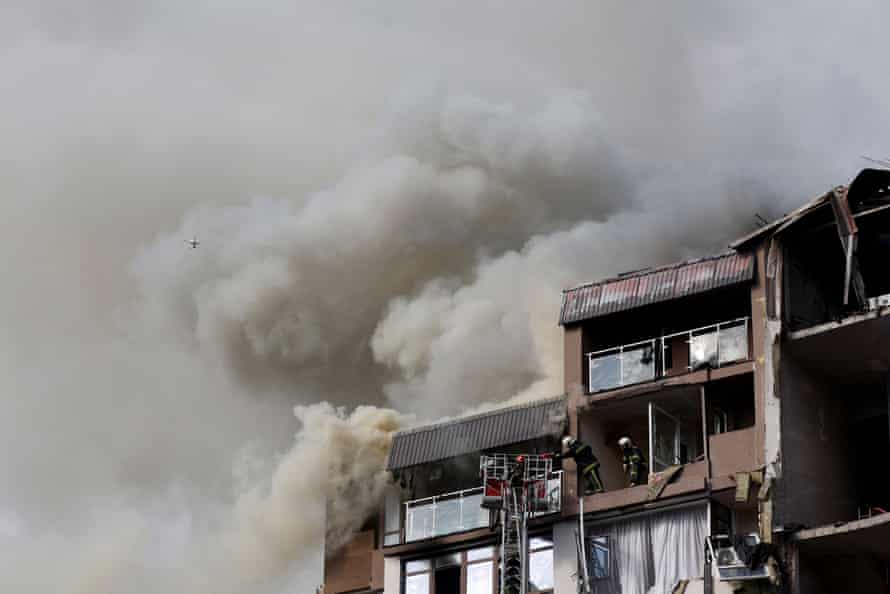
Some of the dozens of long-range Russian missile strikes on Saturday were, for the first time, launched from Tu-22 bombers deployed from Belarus, Ukraine’s military says.
Russia struck multiple targets across Ukraine on Saturday, including the port city of Mykolaiv in the south, the Chernihiv region in the north and a “military object” near Lviv in the west. About 30 Russian missiles were also fired on the Zhytomyr region in central Ukraine, killing one Ukrainian soldier.
Ukraine’s military intelligence agency said the Russian bombers’ use of Belarusian airspace for the first time was “directly connected to attempts by the Kremlin to drag Belarus into the war”.
Ukrainian President Volodymyr Zelenskiy said in his nightly video address on Saturday that as a war that Moscow expected to last five days moved into its fifth month, Russia “felt compelled to stage such a missile show”.
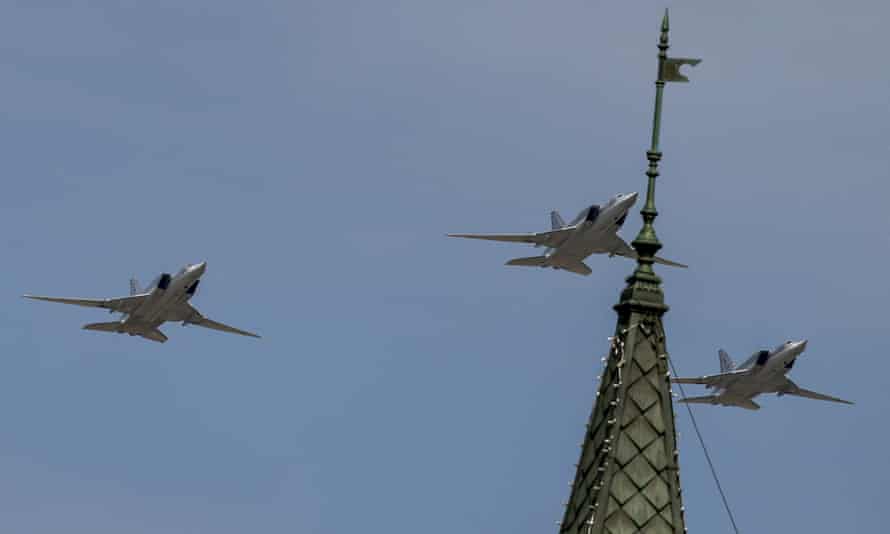
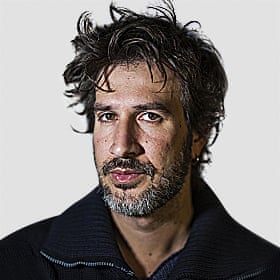
Lorenzo Tondo
Photographer Alessio Mamo and I had just arrived in Kyiv on a night train from Lviv, and as soon as we set foot out of the railway station, we saw four missiles hitting an area of the capital about 5km away from us.
Columns of smoke were rising over the city which has not not come under Russian bombardment for nearly three weeks, and we decided to go right away to the spot to see what happened.
The site of the explosion looked really familiar. And the closer we got to the site, the more I realised that I had already been there. The same area (the same road actually) was hit almost 2 months ago, on 28 April, in a menacing display of defiance while at the time the UN secretary general was visiting the city and a few hours after Joe Biden had announced a doubling of US military and economic aid to Ukraine.
That day, journalist Vira Hyrych, who worked for Voice of America and lived in the apartment hit by the strike, was killed in the attack. And I was there, exactly two months ago, reporting from that spot.
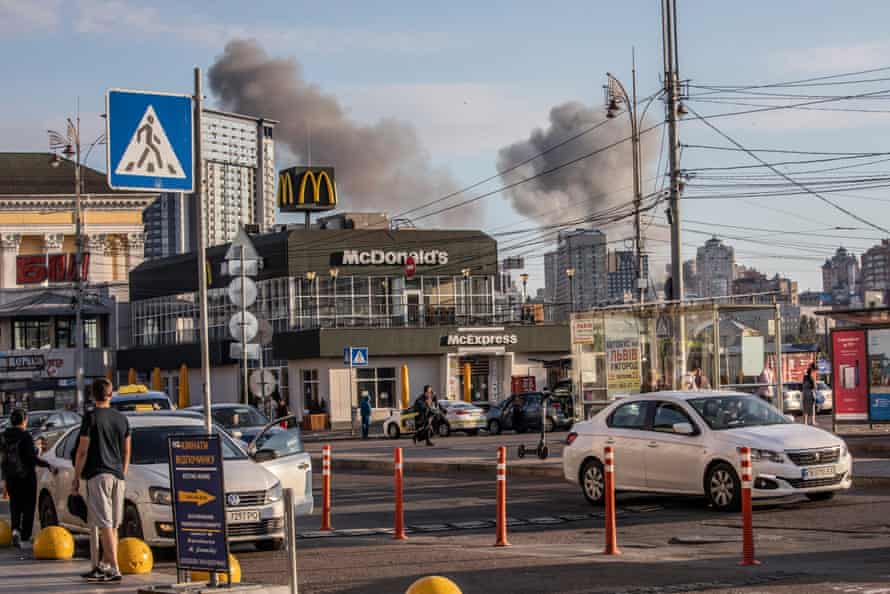
The latest UK defence intelligence briefing says Russia’s capture of Sievierodonetsk in eastern Ukraine was a “significant achievement” for Moscow’s ambitions in the Donbas region.
Pictures of the aftermath of the missile strikes are coming in from our photographer Alessio Mamo.
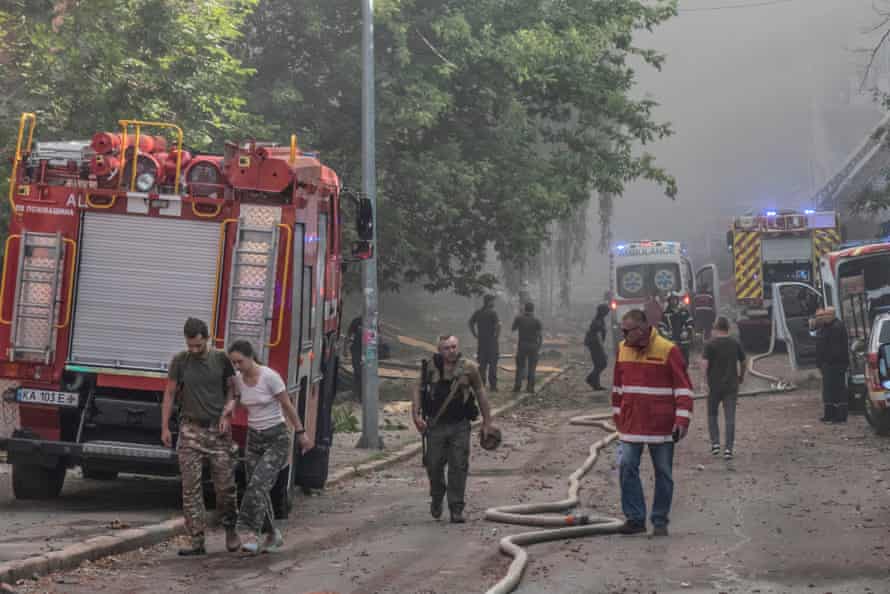
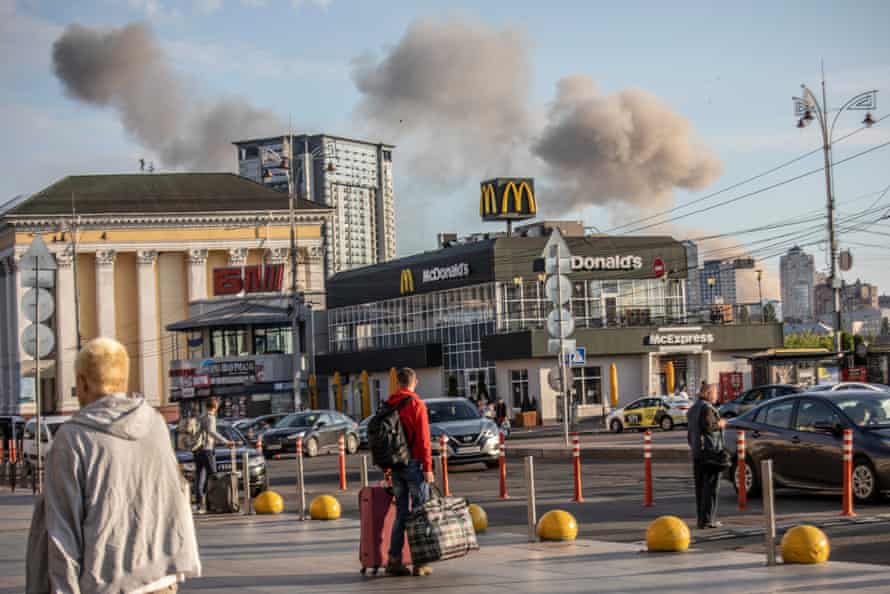
The Kyiv Independent reports that Kyiv Oblast governor Oleksiy Kuleba posted on Telegram that the local air defence system downed a Russian missile early on 26 June. Missile fragments fell in the outskirts of one of the region’s villages.

Lorenzo Tondo
Russia hit Kyiv on Sunday with four cruise missile strikes. At least one struck the lower floors of a residential building in the Shevchenkivskyi district of the capital.
The area was previously hit almost two months ago, on 28 April, in a menacing display of defiance while the UN secretary general was visiting the city and a few hours after Joe Biden had announced a doubling of US military and economic aid to Ukraine.
At the time, journalist Vira Hyrych, who worked for Voice of America and lived in the apartment hit by the strike, was killed in the attack.
There was no immediate information on the cause of the latest explosions or casualties.
The historic district, one of Kyiv’s central, is home to a cluster of universities, restaurants and art galleries.
G7 leaders are gathering in Germany in a meeting set to be dominated by Ukraine and its far-reaching consequences, from energy shortages to a food crisis.
The leaders are expected to seek to show a united front on supporting Ukraine for as long as necessary and cranking up pressure on the Kremlin – although they will want to avoid sanctions that could stoke inflation and exacerbate the global cost-of-living crisis.
The partners are set to agree to ban imports of gold from Russia, a source familiar with the matter told Reuters. A German government source later said that leaders were having “really constructive” conversations on a possible price cap on Russian oil imports.
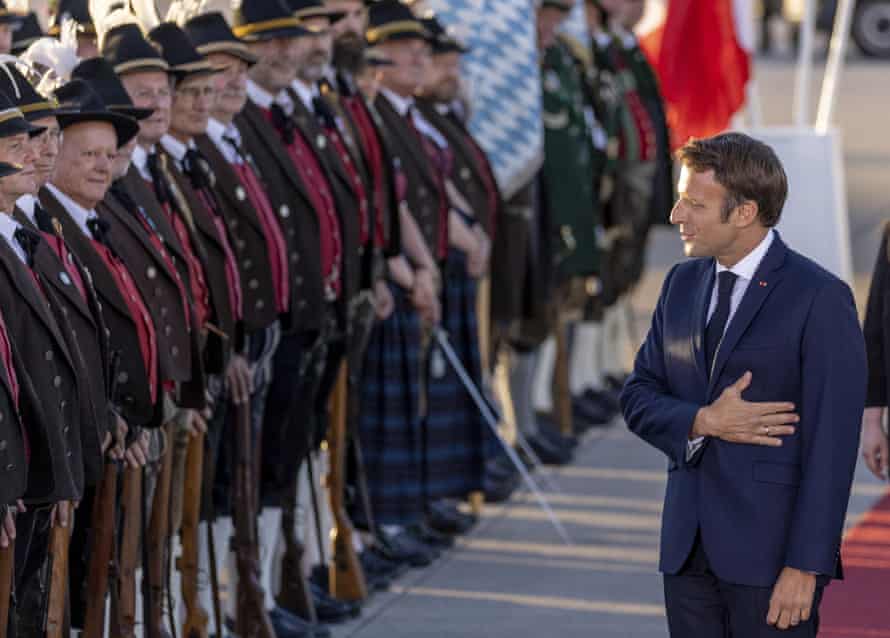
Summary
Hello and welcome to today’s ongoing coverage of Russia’s war on Ukraine. We are now on day 123 of the invasion and you can find a summary of the latest developments here, and shown below:
- Russian forces are trying to cut off the strategic twin city of Lysychansk in eastern Ukraine, having reduced Sievierodonetsk to rubble. Lysychansk is set to become the next main focus of fighting, as Moscow has launched massive artillery bombardments and airstrikes on areas far from the heart of the eastern battles. Ukraine called its retreat from Sievierodonetsk a “tactical withdrawal” to fight from higher ground in Lysychansk on the opposite bank of the Siverskyi Donets river.
- Russia will send missiles capable of carrying nuclear warheads to Belarus in the next few months, Russia’s president, Vladimir Putin, said on Saturday while hosting the Belarusian leader, Alexander Lukashenko. “In the coming months, we will transfer to Belarus Iskander-M tactical missile systems, which can use ballistic or cruise missiles, in their conventional and nuclear versions,” Putin said.
- The mayors of several European capitals have been duped into holding video calls with a deepfake of their counterpart in Kyiv, Vitali Klitschko. The mayor of Berlin, Franziska Giffey, took part in a scheduled call on the Webex video conferencing platform on Friday with a person she said looked and sounded like Klitschko. “There were no signs that the video conference call wasn’t being held with a real person,” her office said in a statement.
- Ukrainian shelling on Saturday forced Russian troops to suspend the evacuation of people from a chemical plant in Sievierodonetsk, just hours after Moscow’s forces took the city, Reuters reported the Tass news agency as saying. Separately, a senior adviser to the Ukrainian president, Volodymyr Zelenskiy, said special forces were still in Sievierodonetsk, directing artillery fire against the Russians. The adviser, Oleksiy Arestovych, spoke in a video address.
- British prime minister Boris Johnson urged G7 leaders to not “give up” on Ukraine as he pledged additional financial support for Ukraine as it attempts to fight the Russian invasion. “Ukraine can win and it will win. But they need our backing to do so. Now is not the time to give up on Ukraine,” Johnson said on Saturday. Britain stands ready to provide another $525m in loan guarantees, a statement from Downing Street.
- The Ukrainian president, Volodymyr Zelenskiy, said on Saturday that Ukraine will win back all the cities it has lost to Russia, including Sievierodonetsk. “All our cities – Sievierodonetsk, Donetsk, Luhansk – we’ll get them all back,” he said in a late-night video address. Zelenskiy also admitted that the war was becoming difficult to emotionally handle.
- Russian attacks have killed three civilians on Saturday in Bakhmut, New York and Pervomaiske in the Donetsk region, according to the region’s governor Pavlo Kyrylenko. Additionally, Russian missile strikes have killed at least three and injured four others in Sarny, a city in Rivne, a western region in Ukraine.
- The US has announced that it will provide 18 patrol boats to Ukraine as part of the 13th security package promised on Thursday. “Included in the package announced Thursday are two 35-foot, small-unit riverine craft; six 40-foot maritime combat craft; and ten 34-foot, Dauntless Sea Ark patrol boats,” the defense department said on Thursday.
Residential buildings hit as Russian missiles strike Kyiv
Russia attacked the Ukrainian capital in the early hours of Sunday morning, striking at least two residential buildings in the Shevchenkivskyi district, Kyiv’s mayor, Vitali Klitschko said.
Emergency services said that as a result of the Russian shelling a fire broke out in a nine-storey residential building, which had been partially damaged in the attack.
Klitschko said that residents are being rescued and evacuated from two buildings.
“There are people under the rubble,” Klitschko said on the Telegram messaging app. He added that several people had already been hospitalised.
“They (the rescuers) have pulled out a seven-year-old girl. She is alive. Now they’re trying to rescue her mother.”
Air raid sirens regularly disrupt life in Kyiv, but there have been no major strikes on the city since 5 June, when a rail car repair facility was hit on the outskirts, and a late April shelling when a Radio Liberty producer was killed in a strike that hit the building she lived in.
The historic district, one of Kyiv’s central, is home to a cluster of universities, restaurants and art galleries.
The blasts occurred around 6.30am local time, half an hour after air raid sirens sounded in the capital.
Our correspondent, Lorenzo Tondo, tweeted this.
